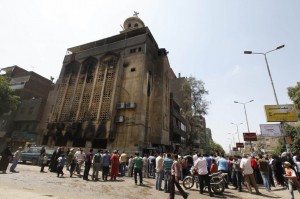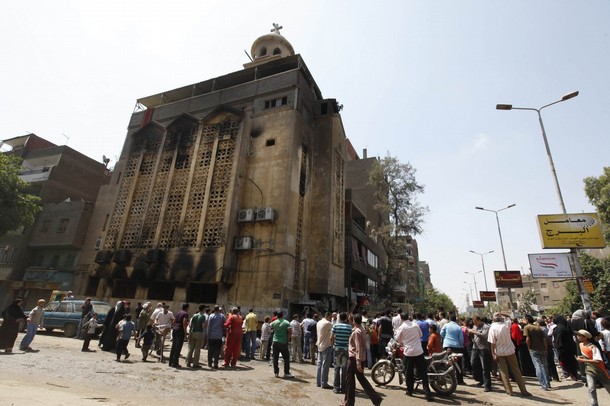 The undersigned human rights organizations express their profound unease at the rising wave of sectarian violence, which threatens to drag Egypt into Muslim-Christian civil strife, after it has become clear that those in charge of administering the country’s affairs in the transitional period following the removal of key figures of Mubarak’s rule have failed to assume their responsibility to enforce the rule of law, protect the lives of citizens, secure guarantees for religious freedoms, deepen the values of equality, repudiate bigotry and religious extremism, and make a clean break with policies from the Mubarak era which only heightened sectarian tensions, partially as a means of distracting the Egyptian people away from corruption and autocracy through sectarian conflicts.
The undersigned human rights organizations express their profound unease at the rising wave of sectarian violence, which threatens to drag Egypt into Muslim-Christian civil strife, after it has become clear that those in charge of administering the country’s affairs in the transitional period following the removal of key figures of Mubarak’s rule have failed to assume their responsibility to enforce the rule of law, protect the lives of citizens, secure guarantees for religious freedoms, deepen the values of equality, repudiate bigotry and religious extremism, and make a clean break with policies from the Mubarak era which only heightened sectarian tensions, partially as a means of distracting the Egyptian people away from corruption and autocracy through sectarian conflicts.
The undersigned organizations are deeply concerned about the sectarian clashes seen in Imbaba, which erupted the day before yesterday and led to the deaths of at least 12 citizens and the injury of 220. Public and private property also came under attack, while the Saint Mina Church was partially destroyed and Virgin Mary Church was burned to the ground, becoming the second church to be intentionally destroyed since the Mubarak regime was deposed.
The undersigned organizations, part of the Forum of Independent Human Rights Organizations, recognize that Egyptians are paying a heavy price for the catastrophic policies pursued by the former regime, which threatened to wholly undermine the foundations for coexistence and civic peace between Muslims and Copts. Unfortunately, Mubarak’s departure has not yet been accompanied by a full break with his policies.
Those in charge of administering the country, both the Supreme Council of the Armed Forces (SCAF) and the Cabinet, have followed in the former regime’s footsteps in refraining from strictly enforcing the law and upholding norms of justice. This is particularly apparent in their disregard for increasing incitement to religious hatred and sectarian violence, their yielding to political expediencies that facilitate impunity for crimes and lack of accountability for the sectarian violence that has erupted in several governorates in the last three months, and their disregard for various forms of collective harassment of Coptic houses of worship- which included permitting thousands of Salafis to hold prayers in front of the Coptic Cathedral in Cairo.
Following the bombing of the Two Saints Church in Alexandria in January, the Forum of Independent Human Rights Organizations submitted a memo to former prime minister Ahmed Nazif, stressing that the ability of state institutions to address sectarian crises is largely dependent on serious action taken to support the pillars of a democratic, civil state and put an end to the use of religion in politics and its infusion in the political and public sphere. Unfortunately, in the months following the downfall of the Mubarak regime, even more widespread appeals have been made to religious figures and movements, which appear to be politically dominant at the moment, especially since the SCAF included on the constitutional amendment committee several members affiliated with political Islam, exclusive of other political affiliations. At the same time, it has placed barriers on the freedom to form political parties and has failed to lift the legal, bureaucratic, and security restrictions on civil society groups, which, along with trade and labor unions and political parties, should be ascendant in the public sphere.
The undersigned organizations warn that the continued failure of those in charge of the country’s affairs to decisively confront sectarian violence and appeals to religious hatred, which are criminalized under international human rights law, threatens to throw the country into a spiral of organized terrorism, the likes of which Egypt experienced in the 1980s and 90s, and recalls the specter of the so-called “Islamic Emirate of Imbaba.”
Therefore, we the undersigned stress the need for independent, fair investigations that will lead to the prosecution and trial of all persons responsible for committing acts of sectarian violence without exception and for all those who incite to them. While, we condemn political and selective solutions that compromise on such crimes and appeals to religious hatred, we also refuse the referral of defendants in the Imbaba case to military trials. We reject in principle the referral of civilians in any case to military tribunals insofar as this deprives them of their right to appear before their natural judge and, in turn, fundamental due process guarantees. We believe that adherence to the principles of the January 25 revolution compel those in charge of the country’s affairs to put an end to military trials for civilians, which was one of the gravest errors of the Mubarak regime. We urge those intellectuals who currently support military trials to reconsider their position, which is inconsistent with one of the most fundamental of all human rights—the right to appear before one’s natural judge. Additionally, we express our astonishment at the support shown by some prominent members of the Muslim Brotherhood for military trials, after they seized to be the targets.
The undersigned organizations call upon the SCAF and the Cabinet to adopt policies and practices to address sectarian crises and defuse the danger of civil-sectarian conflict and the return to organized terrorism, among them:
- Evidence a strict commitment to act upon the principles of citizenship, equality, and equal opportunity for all Egyptians regardless of their religion, belief, or sect, and affirm the state and state institutions’ absolute impartiality towards citizens of different religions and faiths.
- Apply the rule of law and due process guarantees in dealing with sectarian violence and incitement to religious hatred.
- Protect and advance the components and pillars of a civil state, put an end to the increasing use of religion in politics and public sphere, and take immediate action to eliminate religious bigotry in the media and academic curricula, including in al-Azhar curricula.
- Decisively confront all forms of arbitrary interference in the freedom of religious belief, as this is a personal freedom subject to no guardianship, whether of individuals, groups, or the state itself, and secure protection for all persons to adopt and declare their religious beliefs and worship freely.
1. Cairo Institute for Human Rights Studies
2. Egyptian Association for Community Participation Enhancement
3. Human Rights Association for the Assistance of Prisoners
4. Center for Trade Union and Workers’ Services
5. Arabic Network for Human Rights Information
6. New Woman Foundation
7. Association for Freedom of Thought and Expression
8. Egyptian Initiative for Personal Rights
9. Human Rights Legal Aid Group
10. Land Center for Human Rights
11. Egyptian Center for Economic and Social Rights
12. Nadim Center for the Rehabilitation of Victims of Violence
13. Andalus Center for Tolerance and Anti-Violence Studies
14. Hisham Mubarak Law Center
15. Arab Penal Reform Organization
Share this Post

